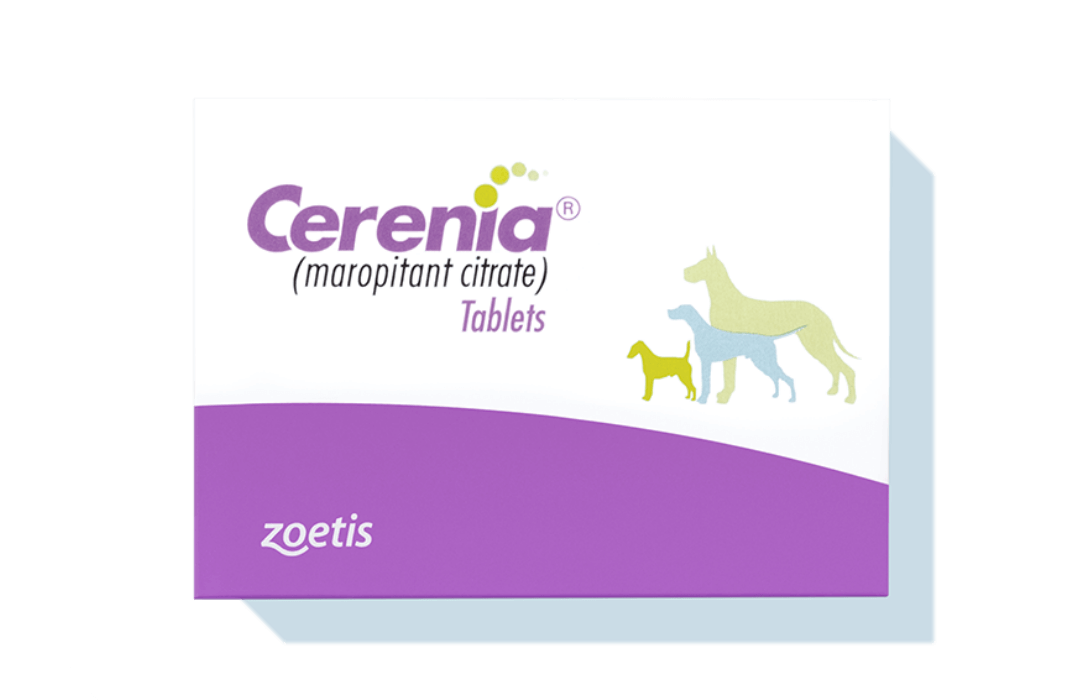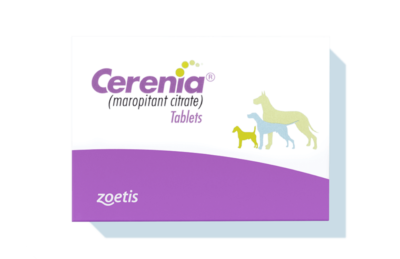
Cerenia is a prescription medication used primarily to prevent and treat vomiting in dogs. Its active ingredient, maropitant citrate, works by blocking the signals in the brain that trigger nausea and vomiting.
Vomiting is a common issue in dogs and can be caused by a variety of conditions, from gastrointestinal problems and infections to motion sickness and the side effects of medications.

While Cerenia is generally considered a safe and effective treatment, like all medications, it comes with both benefits and potential risks. In this article, we will delve into the uses, benefits, risks, and important considerations when using Cerenia for dogs.
The Benefits and Risks of Cerenia for Dogs
What is Cerenia?
Cerenia is an antiemetic medication, meaning it is used to prevent or treat vomiting. The active ingredient, maropitant citrate, works by blocking a substance called substance P, which is involved in the process of vomiting. Substance P acts as a neurotransmitter in the brain that stimulates the vomiting center in the dog’s brain. By inhibiting this neurotransmitter, Cerenia helps to stop vomiting from occurring.
Cerenia is available in both injectable and oral tablet forms. It is commonly prescribed by veterinarians for various situations where vomiting is a concern. Its applications include:
- Motion sickness: To prevent vomiting due to travel or motion-related issues.
- Post-operative care: To prevent vomiting after surgery.
- Gastrointestinal disorders: To treat vomiting caused by conditions like gastritis, pancreatitis, or infections.
- Chemotherapy treatment: To manage nausea and vomiting induced by cancer treatments.
Benefits of Cerenia for Dogs
Cerenia is known for its efficacy in treating vomiting in dogs. Some of the major benefits include:
1. Effective in Preventing and Treating Vomiting
Cerenia is one of the most reliable medications available for managing vomiting in dogs. Its ability to prevent nausea and vomiting has made it a go-to treatment for pet owners and veterinarians.
Whether your dog is vomiting due to motion sickness, an illness, or a reaction to medication, Cerenia can help reduce or prevent the episode. This provides significant relief to dogs that may otherwise be in discomfort or at risk of dehydration and other complications from vomiting.
2. Helps With Motion Sickness
Many dogs suffer from motion sickness when traveling in cars, making trips stressful for both the dog and the owner. Cerenia is one of the few medications approved by the U.S. Food and Drug Administration (FDA) specifically for preventing vomiting due to motion sickness in dogs. It works by blocking the signals in the brain that cause nausea and vomiting associated with movement, making travel more comfortable for both the dog and the owner.
3. Post-Surgical Relief
After a dog undergoes surgery, vomiting can be a common side effect, either due to the anesthesia or the stress of the procedure. Cerenia can be used as part of post-operative care to prevent vomiting and help the dog recover more comfortably. By preventing vomiting, it also reduces the risk of complications, such as aspiration pneumonia, which can occur if vomit enters the lungs.
4. Gastrointestinal Disorders
Vomiting is often a symptom of underlying gastrointestinal issues, such as gastritis, pancreatitis, or infections. In these cases, Cerenia can provide relief by stopping the vomiting while the underlying condition is treated. It helps ensure that the dog remains hydrated and can keep food and medications down, which is essential for recovery.
5. Cancer Treatment Support
Dogs undergoing chemotherapy can experience nausea and vomiting as side effects of the treatment. Cerenia is often used in combination with other medications to manage these symptoms. By controlling vomiting and nausea, Cerenia helps improve the dog’s quality of life during the treatment period.
Risks and Side Effects of Cerenia
While Cerenia offers significant benefits, it is important to be aware of the potential risks and side effects associated with the medication. Most dogs tolerate Cerenia well, but some dogs may experience adverse reactions. The risks associated with Cerenia can include:
1. Common Side Effects
The most commonly reported side effects of Cerenia are mild and usually short-lived. These may include:
- Drowsiness or lethargy: Some dogs may feel sleepy or sluggish after taking Cerenia. This side effect tends to subside as the dog adjusts to the medication.
- Diarrhea or mild gastrointestinal upset: Some dogs may experience soft stools or mild digestive discomfort when taking Cerenia. This is usually temporary and resolves on its own.
- Loss of appetite: In rare cases, some dogs may have a reduced appetite after taking Cerenia. If your dog is refusing food for more than 24 hours, consult your veterinarian.
These side effects are generally mild and do not require discontinuation of the medication unless they persist or worsen.
2. Allergic Reactions
Although rare, some dogs may have an allergic reaction to Cerenia. Signs of an allergic reaction can include:
- Swelling of the face, lips, or tongue
- Difficulty breathing
- Hives or rashes
If your dog shows signs of an allergic reaction, it is essential to stop the medication and contact your veterinarian immediately.
3. Overdose
An overdose of Cerenia can lead to more severe side effects. Symptoms of an overdose may include excessive sedation, vomiting, or diarrhea. If you suspect your dog has ingested too much Cerenia, contact your veterinarian or an emergency animal clinic right away.
Treatment will focus on managing the symptoms of the overdose, and the veterinarian may induce vomiting or administer activated charcoal to limit further absorption of the medication.
4. Not Suitable for All Dogs
Cerenia is generally safe for most dogs, but it may not be suitable for dogs with certain medical conditions. For example, dogs with a history of liver or kidney disease may require special consideration before using Cerenia.
Additionally, Cerenia should not be used in puppies younger than 16 weeks old, as its safety in this age group has not been established.
5. Interaction with Other Medications
Cerenia can interact with certain medications, particularly those that affect the central nervous system. Always inform your veterinarian of any other medications your dog is taking before starting Cerenia. For instance, Cerenia should be used cautiously in combination with sedatives or other drugs that cause drowsiness.
READ ALSO: Essential Uses of Mupirocin Ointment for Pet Wounds and Infections
How to Administer Cerenia
Cerenia is available in both injectable and oral tablet forms. The appropriate method of administration will depend on your veterinarian’s recommendation.
Oral Tablets: The tablets should be given with food to help reduce the risk of gastrointestinal upset. Follow your veterinarian’s instructions regarding the dosage and frequency of administration. Typically, the dosage for motion sickness is one tablet one hour before travel. For other conditions, it may be prescribed once daily for a specific period.
Injectable Form: The injectable form of Cerenia is administered by a veterinarian. It is typically used for more severe cases or in dogs that cannot take oral medications. The veterinarian will determine the appropriate dosage and frequency based on the dog’s condition.
When Should You Use Cerenia for Your Dog?
Cerenia is useful in various situations where vomiting is a concern. Common scenarios in which Cerenia may be prescribed include:
Motion Sickness: If your dog experiences nausea and vomiting during car rides or travel, Cerenia can be used to prevent these symptoms.
Post-Surgical Recovery: After surgery, your veterinarian may administer Cerenia to prevent vomiting and help with recovery.
Gastrointestinal Disorders: If your dog has vomiting due to conditions like gastritis or pancreatitis, Cerenia can provide relief while the underlying issue is treated.
Chemotherapy Side Effects: Dogs undergoing chemotherapy may be prescribed Cerenia to manage vomiting and nausea associated with cancer treatments.
FAQs
How quickly does Cerenia work in dogs?
Cerenia works relatively quickly, often providing relief from nausea and vomiting within a few hours of administration. When used for motion sickness, it is usually effective if given one hour before travel.
Can Cerenia be used for all types of vomiting in dogs?
Cerenia is effective for most causes of vomiting, but it is primarily used for vomiting caused by motion sickness, post-surgical recovery, and gastrointestinal conditions. It is not effective for treating vomiting caused by toxins or infections, which require different treatments.
Is Cerenia safe for long-term use in dogs?
Cerenia is generally safe for short-term use, especially for conditions like motion sickness or post-operative vomiting. However, long-term use should only be under the guidance of a veterinarian. Chronic vomiting may require further diagnostic investigation to address the underlying cause.
Can Cerenia be given to puppies?
Cerenia is not recommended for puppies under 16 weeks of age. Always consult your veterinarian before administering any medication to young puppies.
Are there alternatives to Cerenia for vomiting in dogs?
Yes, other antiemetic medications like ondansetron, metoclopramide, or maropitant may be used as alternatives, depending on the cause of the vomiting. Your veterinarian will determine the best option based on your dog’s specific needs.
Leave a Reply
You must be logged in to post a comment.